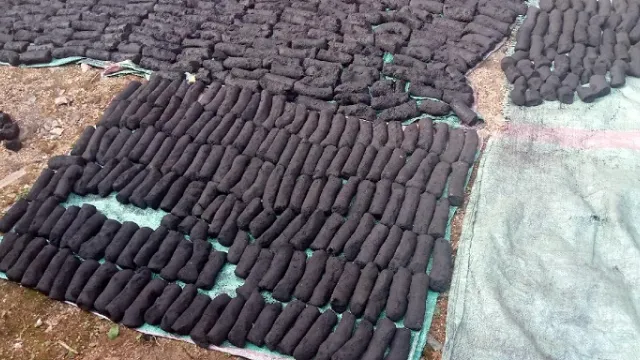We’re making it in life, thanks to our briquette-making venture

We’re making it in life, thanks to our briquette-making venture
For many entrepreneurs, selling and marketing goods and services presents the most challenging tasks even as other overarching challenges exist.
From trade barriers to entry, inadequate and inaccessible markets, linking up products to the final consumer can be a heart-wrenching affair with incomes failing to match up to input costs.
However, it has been a different and curious tale for Jeremiah Wachira, the head of Kamulu Program of Disabled Persons in the outskirts of Nairobi County.
For him and his group, marketing has been the least of challenges posed after having a go at various business ventures.
The group makes and sells briquettes for a living, but this has not always been the case.
“We have had a lot of projects in our goal of assisting the disabled among us, including merry-go-round savings schemes, jiko-making and tea planting projects.
Read also: Wild ride puts Kenya in world stage, promises good tidings
These initiatives have, however, always gone down the drain for several factors such as lack of expertise and motivation, water shortages and disruptions from the recent COVID-19 pandemic,” said Mr Wachira.
It wasn’t until Mr Wachira considered briquette making business through a business partner that he hoped the group have finally stumbled upon the proverbial gold dust.
Nevertheless, the group has struggled to keep a viable business from the lack of key equipment despite the existence of a ready market.
“There is always a ready market for briquettes. For instance, we had a supermarket ready to buy our product but we could not match the demand set by the buyer.”
Among the key tool sought by the group was a briquette-making machine to negate the use of hand skills and increased output period.
With funding from Safaricom Foundation Ndoto Zetu initiative, the group of 100 has seen their output grow significantly with the Kes 500,000 provided to them, allowing the purchase of a welding and grinding machine as well as a water tank.
“Without a machine, we would barely produce anything. Today we can net as much as two tonnes of product,” added Mr Wachira.
“Before, the disabled waited for handouts. Today, the disabled are engaged in an income generating venture.”
The Kamulu Program of Disabled Persons is just one of the tens of beneficiaries under Safaricom Foundation Ndoto Zetu initiative which is premised on transforming lives.
The project, which is currently in its third phase, has benefited multiple groups across the board, covering sectors including health, economic empowerment and education.
In just three years since its launch, the initiative has impacted millions of Kenyans both directly and indirectly across all 47 counties.
The number of beneficiaries and the pool of funding for the project continues to expand by the day as Safaricom seeks to spread out its tentacles of transformation.
This year, Ndoto Zetu intends to impact even more groups from its Kes 100 million budget.
A total of 20 widows in Nakuru County have, for instance, received sewing machines while Mahiga Children’s home in Nyeri County has received briquette making machines to cut their fuel costs which represent their biggest cost base.



